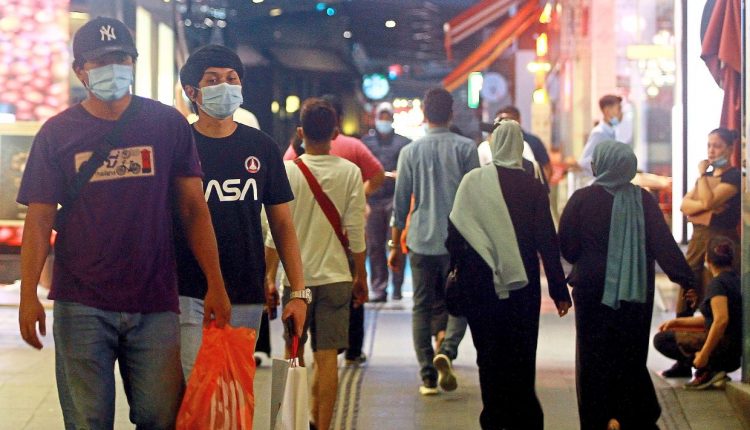KUALA LUMPUR: The reappearance of traffic jams and crowded malls are good signs for the economy, especially after the quiet economic period that defined the movement control order (MCO) and the conditional MCO.
Traffic jams and crowded malls mean that people are going back to work. Theoretically, this should lead to increased consumer spending. Has it?
A study from the Statistics Department shows that 90% of workers have now returned to work, significantly higher than the 67.2% recorded in May and 83.5% in early June.
However, real economic activity has yet to catch up. For instance, retail sales performance is still only at 30% of pre-MCO levels and only 15.6% of hotel rooms are occupied.
Although the Malaysian economy grew at 0.7% in the first quarter, due to the pandemic, the consensus is that it will contract in the second quarter.
The World Bank, in its newly published Malaysia Economic Monitor, predicts Malaysia’s economy to contract by 3.1% this year, much lower than Bank Negara’s projection in March of between 0.5% growth and 2.0% contraction.
Malaysia is not alone.
Indeed, the World Bank and the IMF project the global economy to contract by 5.2% and 4.9% respectively.
This is the most serious worldwide recession since World War II. This is the magnitude of the challenge we have ahead of us. The government is aware and doing all we can to manage the situation and its impact on all of us.
On the health front, government SOP and the hard work of frontliners have resulted in a relatively low rate of Covid-19 transmission.
Our focus on health has paid off. Now, public health experts have deemed it safe for us to loosen restrictions and realign our priorities to the economy – carefully returning to our normal economic activities.
In this effort, the government has begun easing the MCO since June 10 and has been moving away from a strict enforcement approach in managing Covid-19 to a strategy that is more self-regulatory.
The onus is now on the rakyat to remain steadfast. Continue to take all safety precautions – wash your hands regularly, wear masks, and where you can, try to maintain physical distancing.
As we move from the health of our people to the health of our economy, the government’s fundamental concern is the rising rate of unemployment.
Not only have workers been retrenched during the course of this pandemic, there are first-time job seekers entering the labour market every year. Indeed, some 300,000 students graduate from our universities and colleges annually.
This is why it is urgent for us to accelerate economic activity. For Mak Cik Kiah, Uncle Lim, Surjit Kaur and everyone else to have stable incomes and thriving businesses, we must all do our part to reopen and revitalise the economy.Over the next few months, we will hopefully see more relaxation of Covid-19 measures, especially after the recovery MCO, which is slated to end on Aug 31.
Already, the government is reopening the education sector – starting with students in key examination years such as SPM and STPM.
Seminars, conferences, weddings and cinema screenings are all slated to open after July 1.
So by all means, go ahead and take your family out to do activities that you have not been able to do the last three months. Spend accordingly while you do that. You will be helping the economy!
EP1 Pass Holders, that is, expatriates earning more than RM10,000, including those holding professional visit passes, resident talent passes, and key posts, may now re-enter the country without additional approval from the Immigration Department.
Besides that, medical tourists may enter the country for treatment after registering with the Malaysia Healthcare Travel Council and the Health Ministry.
Other nations such as Germany and France have already reopened their borders to EU member states. The Ambassador of France paid a courtesy call on my office the other day, and convinced me of the efficacy of “travel bubble arrangements”.
He informed me that “travel bubbles” with countries that have contained Covid-19 could provide relief to the badly damaged tourism sector. The government is looking at the possibility of emulating this.
The stimulus measures implemented by the government, namely Prihatin and Penjana, have succeeded in providing some relief for the rakyat and could potentially contribute to almost 3.5 percentage points to GDP growth.
It must be remembered, however, that these stimulus packages were not meant to be the end-all in terms of economic relief.
It was crafted to first cushion the impact of this unprecedented situation, especially for the most vulnerable Malaysians – as well as to provide the spark needed for the economy to start running again.
But there is still a lack of confidence among the people to go out, which in turn leads to a lack of consumer spending.
The rakyat are afraid of contracting Covid-19.
However, without household spending, the government’s stimulus measures will fall flat on its face as one of the desired outcomes of these stimulus packages is to help businesses pick up.
So, for as much as we are able to, let’s spend and keep businesses afloat.
Let’s spend and help Malaysia.
Datuk Seri Mustapa Mohamed is Minister in the Prime Minister’s Department in charge of economy.
-The Star

